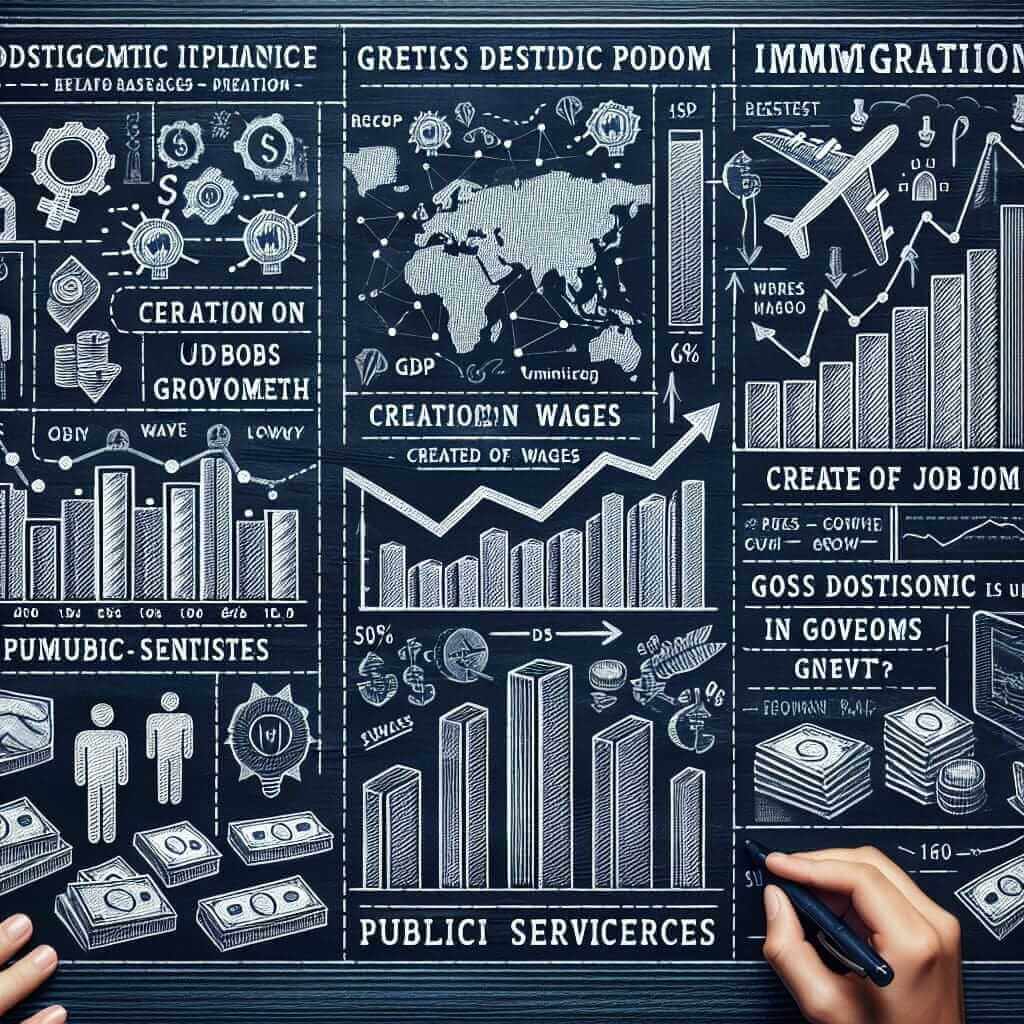The impact of immigration on national economies is a multifaceted and frequently debated topic in today’s globalized world. It is a subject that often arises in the IELTS Writing Task 2, requiring test-takers to demonstrate their ability to present a balanced and well-reasoned argument. This article will delve into this complex issue, exploring both the positive and negative aspects, and provide you with the tools to craft a compelling IELTS essay.
We will examine real exam questions, analyze a sample essay, and equip you with essential vocabulary to succeed in your IELTS Writing exam.
Here are some potential IELTS Writing Task 2 questions related to this topic:
- To what extent do you agree or disagree with the statement: “Immigration brings more benefits than drawbacks to a nation’s economy.”?
- Discuss the economic impacts of immigration on both the host country and the country of origin.
- Some people argue that governments should restrict immigration to protect their citizens’ jobs. Others believe that immigration boosts the economy and creates new opportunities. Discuss both views and give your own opinion.
Sample Essay Analysis
Chosen Question:
“Immigration brings more benefits than drawbacks to a nation’s economy.” To what extent do you agree or disagree?
Essay Analysis:
This question requires you to present a clear stance on whether immigration’s benefits to a national economy outweigh its disadvantages. You need to provide a balanced discussion, addressing both sides of the argument while supporting your opinion with relevant examples and evidence.
Model Essay:
Immigration, the movement of people across national borders, has been a topic of intense debate, particularly concerning its economic repercussions on host nations. While some argue that it presents more advantages than disadvantages, I believe the impact of immigration on a country’s economy is nuanced and depends on various factors.
Proponents of immigration often highlight its potential to bolster the workforce and stimulate economic growth. Immigrants often fill labor shortages in key sectors, bringing with them a diverse range of skills and expertise. For instance, many developed countries face a decline in their aging populations, leading to gaps in industries like healthcare and technology. Immigrants can fill these vacancies, contributing to productivity and economic output. Moreover, by increasing the consumer base and creating new businesses, immigrants inject dynamism into the market, fostering innovation and competition.

However, it is essential to acknowledge the potential downsides of immigration. One significant concern is the strain it can place on public services and infrastructure. A sudden influx of immigrants may overwhelm housing, healthcare, and education systems, leading to resource scarcity and potentially impacting the quality of life for both existing residents and newcomers. Furthermore, some argue that immigration can depress wages in certain sectors, particularly low-skill jobs, as employers may favor cheaper labor. This situation can exacerbate income inequality and social tensions.
In conclusion, while immigration can undoubtedly offer economic benefits such as workforce expansion and market growth, it is crucial to consider the potential drawbacks like pressure on public services and potential wage depression. A balanced approach that welcomes immigrants while addressing the concerns of existing residents through effective integration policies and infrastructure investments is vital to harnessing the full economic potential of immigration.
(Word count: 289 words)
Key Considerations:
- Structure: The essay follows a clear structure – Introduction, Body Paragraph 1 (Benefits), Body Paragraph 2 (Drawbacks), Conclusion.
- Vocabulary: The essay uses a range of vocabulary related to economics and immigration.
- Grammar: The essay uses a variety of grammatical structures, including complex sentences and conditionals.
- Coherence & Cohesion: The essay flows logically and uses appropriate linking words and phrases to connect ideas.
Vocabulary Focus:
- Bolster (verb): /ˈboʊlstər/ – to support or strengthen.
- Expertise (noun): /ˌɛkspərˈtiːz/ – expert skill or knowledge in a particular field.
- Vacancies (noun): /ˈveɪkənsiz/ – unoccupied positions or jobs.
- Dynamism (noun): /ˈdaɪnəmɪzəm/ – the quality of being characterized by vigorous activity and progress.
- Exacerbate (verb): /ɪɡˈzæsərbeɪt/ – to make a problem, bad situation, or negative feeling worse.
Conclusion
Understanding the impact of immigration on national economies is crucial for succeeding in the IELTS Writing Task 2. By familiarizing yourself with the key arguments, using relevant vocabulary, and presenting a well-structured and coherent essay, you can confidently tackle this complex issue and achieve a high band score. Remember to practice writing essays on a variety of topics related to immigration and economics to further enhance your skills.